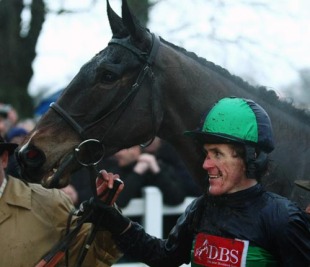- February 9 down the years
A magic milestone for McCoy
The sporting events of February 9 down the years
2009
Tony McCoy rode his 3000th winner at Plumpton on a horse called Restless D'Artaix. Widely regarded as the finest National Hunt jockey, McCoy's roll of honour is quite stunning. His first win came on March 26, 1992 and he has not looked back since. He was crowned champion jockey for the 14th time in 2009 and he shows no signs of stopping. Champion Hurdle, Gold Cup and King George VI wins feature on his CV. He won the Grand National in 2010.
1980
Eric Bristow became world darts champion for the first time. After losing in the first round on February 6, 1978, he reached the final this time and kept his nerve as Bobby George refused to crack. Bristow trailed 0-1, 1-2, and 2-3 before breaking through to take the title 5-3. He won it four more times.
1936
Skiing's first appearance at the Winter Olympics. Only two events were staged in Garmisch-Partenkirchen, the men and women's combined. Ladies first, won by Christl Cranz, one of the least surprising winners ever: she accumulated a record 12 World Championship titles. Here she was sixth in the downhill but first in both slalom runs. The men's event later today was won by another German, Franz Pfnür, who followed Cranz's pattern of finishing second in the downhill and first in the slaloms.
1991
Sugar Ray Leonard fought his last world title fight, more than 11 years after his first. He was 34 by now, and Terry Norris was 11 years younger. He knocked the great man down in the second and seventh and won a unanimous decision after 12. Leonard made a comeback six years later but Hector Camacho stopped him in five and he stayed retired this time.
1896
The first ice skating World Championships here held in St Petersburg. They consisted of only one event, the men's individual, which was won by Gilbert Fuchs of Germany. He finished ahead of Austria's Gustav Hügel and two Russians. Hügel won the title the following year and again in 1899 and 1900. Fuchs had to wait ten years to win it again.
2008
Ireland ran France close in Paris, but Ronan O'Gara's three penalties were trumped by Vincent Clerc's three tries, and the French won 26-21. These were the last of the seven tries Clerc scored against Ireland. They included two the previous September and a last-minute heartbreaker on February 11, 2007.
1950
At the Commonwealth Games, Peter Gardner of Australia won gold in the 120 yards hurdles. But the talking points were the ages of other competitors. Tom Lavery of South Africa won bronze at 38, and England's Don Finlay finished fourth at 40 after a slow start. Lavery had won the title in 1938, Finlay in 1934. Finlay was also European champion in 1938 and won silver and bronze at the Olympics.
1958
Sandy Lyle was born in Shrewsbury but played golf for Scotland. And rather well for himself. After winning the Open in 1985, he played a famous bunker shot at the last to win the Masters three years later. He took the individual title at the 1980 World Cup, topped the European Order of Merit three times, and won the World Matchplay in 1988 after losing four previous finals. He helped Europe win the Ryder Cup in 1985.

1998
At the Winter Olympics, Germany's Georg Hackl won his third gold medal in a row. He'd lost all six luge races in the World Cup that season - apparently on purpose, to draw attention away from the new sled he'd designed himself. Other teams protested against his aerodynamic yellow boots (yes, seriously), but he got to wear them and they did the trick: he was fastest in all four runs. On February 11, four years later, Hackl set a record by any competitor at the Olympics, Winter or Summer. All with the same dodgy moustache.
1974
In boxing, good big ones usually knock the ambition out of good little ones. Muhammad Ali with Bob Foster, Mike Tyson with Michael Spinks, today Carlos Monzón with José Napoles. Napoles was one of the top welterweights, a smooth mover and sharp puncher. Apart from a brief interlude caused by a cut eye, he held the world title for seven years. But Monzon was arguably the greatest middleweight of all time, and middleweights are quite a bit bigger than welterweights. After just six rounds of Monzón's stiff punching, Napoles retired on his stool. A cut eye, they said, though his resistance was severed too. He lost his own world title to a British boxer on December 6, 1975. the following year. Monzón never lost his to anyone.
1905
David Burghley was born in Lincolnshire and became one of Britain's most successful hurdlers. At the 1928 Olympics, he beat the defending champion to win the 400 metres hurdles in a Games record time. Four years later, he finished fourth and won silver in the 4x400 relay. In 1930, he won both hurdles events and the relay at the inaugural Empire (later Commonwealth) Games. He set his only world record at the 440 yards hurdles. It lasted less than a day.
1986
The first boxer to become world light-heavyweight champion three times. Marvin Johnson won the WBC title in 1978 and the WBA version the following year, each time against formidable foes: Mate Parlov and Víctor Galíndez. But he lost his first defence both times. Now the WBA title was vacant, and Johnson filled it when Trinidad's Leslie Stewart retired with a cut. This time Johnson won his first defence, but lost his second - to Stewart.

